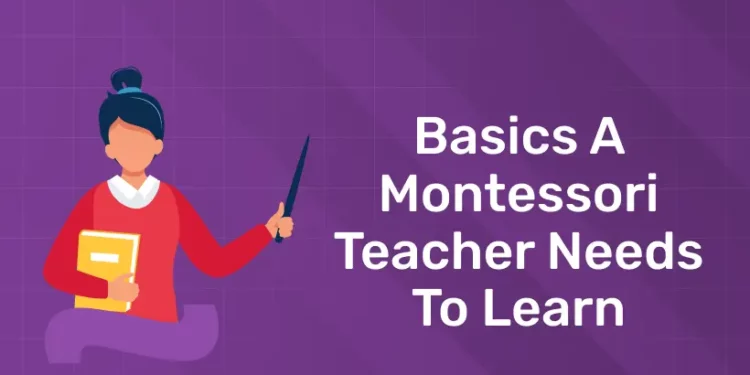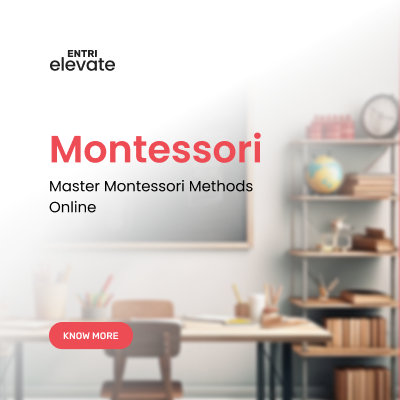Table of Contents
What comes to mind when you picture a classroom? For many of us, the scene is one in which kids are seated at desks and a teacher is lecturing them in front of a blackboard. Early childhood education and development have been transformed to a more child-focused, self-directed approach for more than a century by the Montessori method, which has been pushing education away from this traditional model. In this blogpost we are providing the basic principles a montessori teacher must learn.
Unlock your passion for education and shape young minds as a Montessori teacher!
What Is The Montessori Method Of Teaching?
To support children’s development in the four developmental domains of early childhood education—physical, mental, expressive, and social-emotional—the Montessori method is an educational strategy that guides children via self-directed and self-motivated learning, activities, and play. Maria Montessori was a physician and educator from Italy who developed it. Upon studying human development from conception to maturity, she created the whole child approach, which provides students with the framework and resources necessary for success both within and outside of the classroom.
The objective of the Montessori approach is to lay a solid foundation for children to grow into driven, self-directed learners who, as they pursue further education and growth, will eventually become successful adults. Preschoolers may be able to achieve independence, confidence in their abilities, and a sense of self-worth by attending to their needs in a safe, stimulating, and caring Montessori classroom.
Five Basic Principles Montessori Teachers Must Learn
- Respect for the child
- The Receptive mind
- Sensitive Periods
- The staged setting
- Self-study
Respect for the child
Respect for children and their learning process is emphasized in the Montessori technique. Every child has needs, limitations, talents, and strengths and shortcomings. Children are given priority when there is respect for them, and this calls on teachers to refrain from giving them direct instructions. The Montessori approach, on the other hand, demands that teachers respect the kid by allowing them to make their own decisions about their education. It is courteous to refrain from interfering with their work or focus. By illustrating that children should be valued and given the freedom to flourish on their own, Montessori programs challenge the way that people see traditional educational standards.
Start your journey to becoming a certified Montessori teacher! Get free Demo Here!
The Receptive mind
Kids’ minds are “absorbent.” Children’s rapid and effortless assimilation of information from their surroundings is made possible by their high levels of cerebral activity from birth until preschool age. Think about how simple it appears for young children to acquire numerous languages at the same time. Their inquisitive minds continually aid in their learning just by virtue of existing and experiencing.
Sensitive Periods
Sensitive periods are defined as particular developmental phases when kids are open to learning a particular skill or aptitude. They are especially responsive to events and information that support the growth of that talent. For instance, there are times when kids are sensitive to counting or language acquisition. Every youngster experiences sensitive phases in a different order and at a different time. In order to recognize sensitive times and set up the environment to suit the requirements of the kids, Montessori teachers are trained to observe the kids.
The staged setting
Children go through several developmental stages in their early years. Their demands shift as they pass through various phases. The teacher in a Montessori classroom is in charge of setting up “the prepared environment.” They accomplish this by carefully choosing and setting up the resources in a logical sequence to suit the kids’ developmental needs. By setting up the classroom such that a kid can work independently, Montessori teachers can support a child’s development and capacity to move forward at their own speed.
Self-study
A kid learns best when given the freedom to solve problems on their own, according to the auto-education philosophy of Montessori education. The kids educate themselves, but teachers offer direction, support, and the right atmosphere.
Entri’s Montessori Teacher Training Course
The Montessori Teacher Training Course from Entri will assist you in learning the more complex methods, such as role playing and curriculum-based project management. The students will receive internationally recognized certificates that will aid them in their job search.
Obtaining a postgraduate degree in Montessori education will lead to additional specializations in the field of education. The candidates will be able to pursue their studies more effectively than anywhere else in the world with the help of flexible course plans. The Postgraduate course offered by Entri offers new possibilities for the teachers in the Montessori teaching sector. At Entri, the mentors will help you understand how to properly coach the younger minds.
CONCLUSION
Any prospective Montessori teacher should make sure they keep in mind the aforementioned principles when they are enrolled in a teacher training program. What more are you waiting for, then? Enroll in our montessori teacher training program to present yourself in the best possible light when you enter the teaching profession!
Frequently Asked Questions
How do Montessori teachers maintain order in a classroom that offers freedom of movement and choice?
Montessori educators set up explicit guidelines and procedures, instruct kids in the polite use of objects, and set an example of proper conduct. When required, they also offer tailored advice and direction.
What is the ultimate goal of Montessori education, and how do teachers work towards achieving it?
The ultimate objective of a Montessori education is to support the growth of self-directed, autonomous learners who can make valuable contributions to society. To achieve this, Montessori educators foster each child’s innate creativity, curiosity, and love of learning.
Can Montessori principles be applied in a traditional classroom setting?
While many of the tenets of Montessori education—such as respect for the child, customized instruction, and hands-on learning—can be applied to standard classroom settings with the necessary adaptations, the program is generally linked with particular locations and materials.










